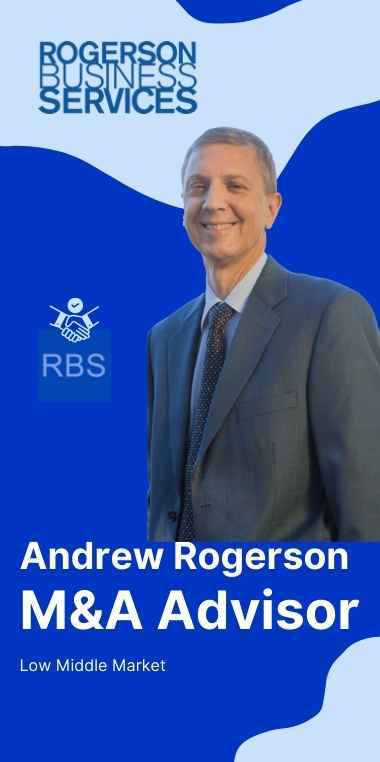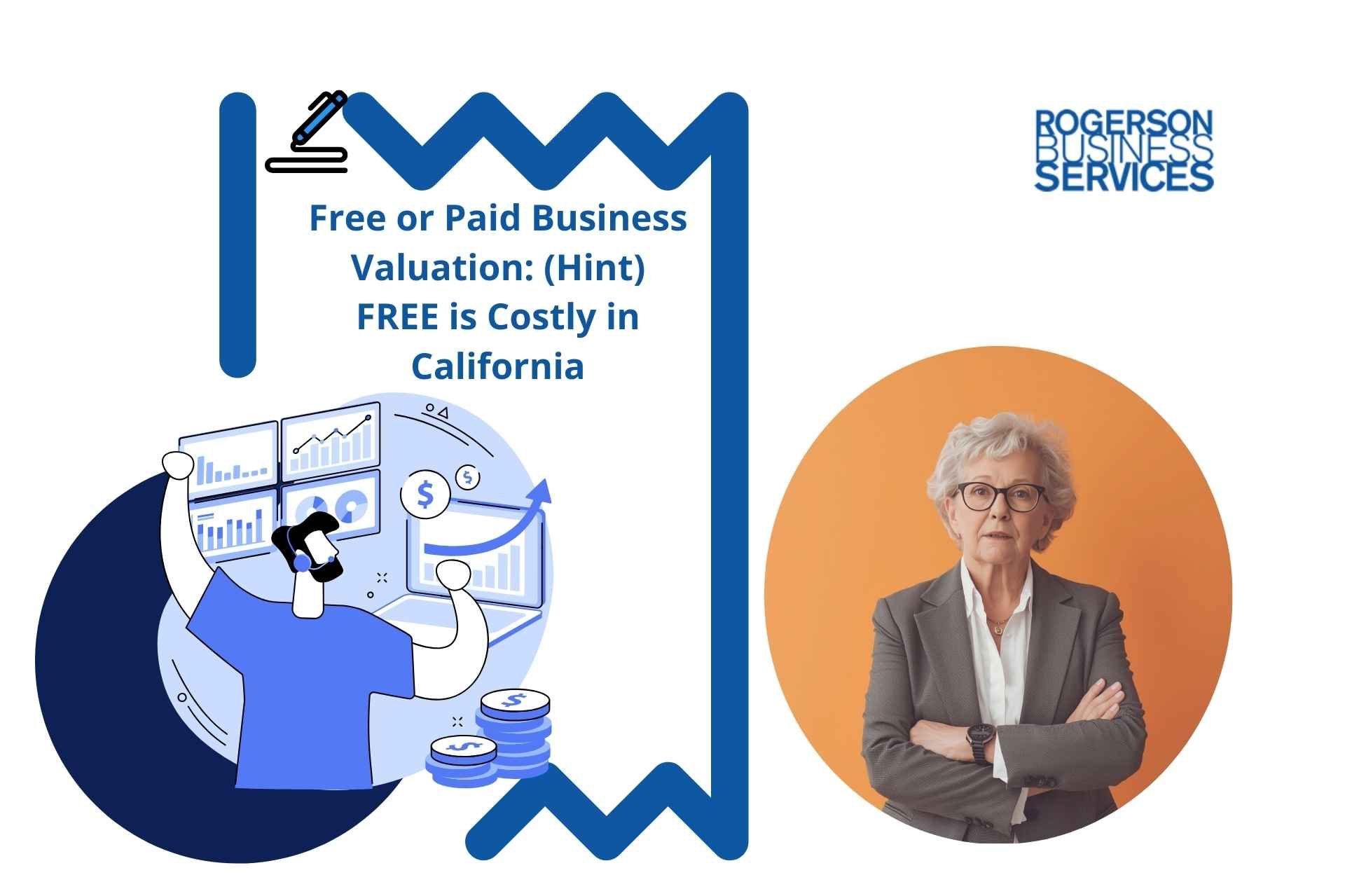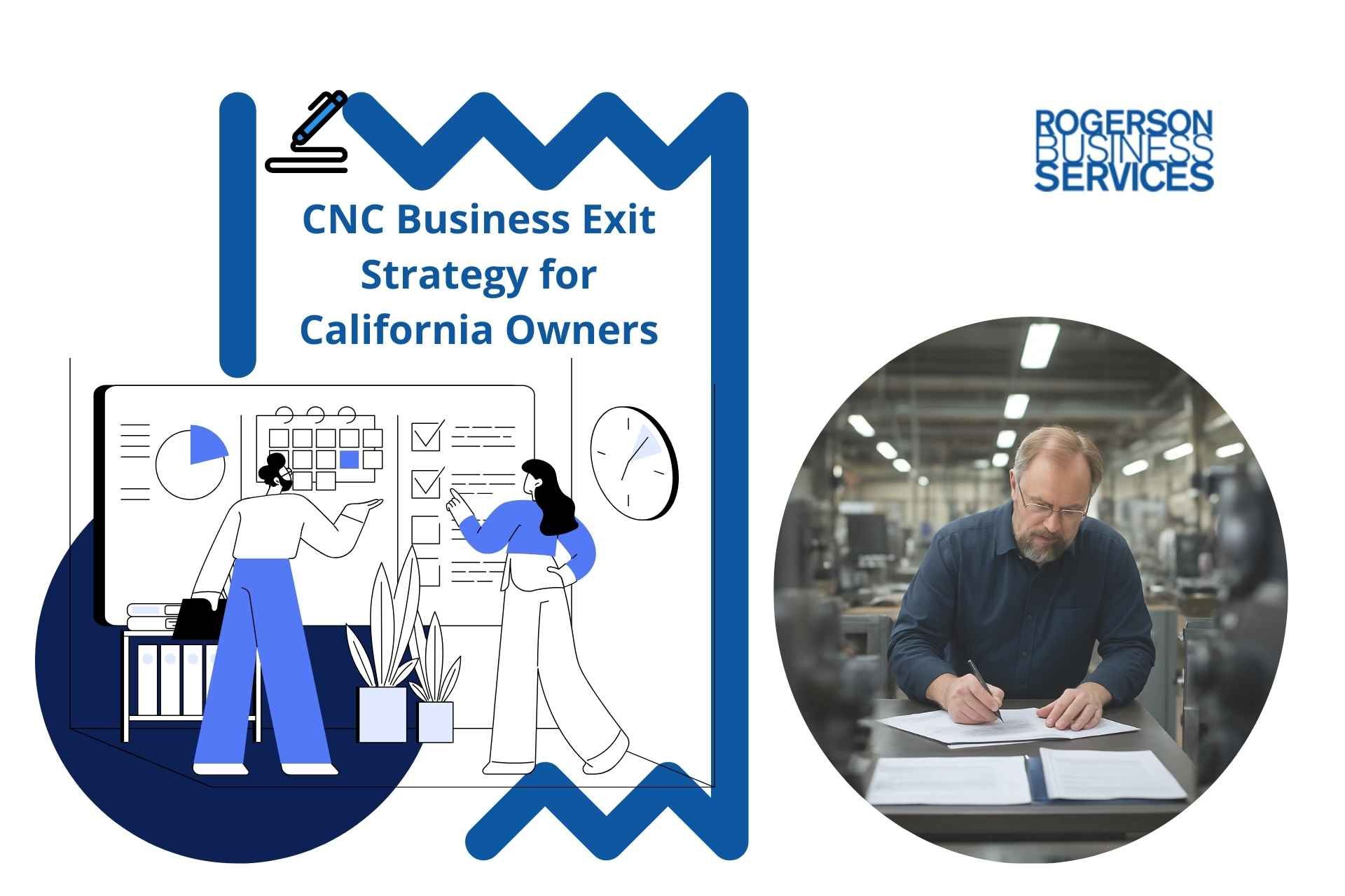The Ultimate Guide To Help Exit an Education Company
Considering an exit strategy from your lower middle-market education company in California can be overwhelming. Without a proper, well prepared, exit plan, and an intermediary or professional business M&A Advisor to facilitate the process, there is no way to guarantee that you made the right decision.
Get The Guide
M&A Guide
Increase Your Chance Of Success!
Guide to Help Exit an Education Company
Everything you need, all in this M&A exit strategy
Exit Strategies
Having a business exit strategy for any company gives business owners an idea of how much money they can get out of the business. The exit strategy also gives business owners ideas on how to manage that money with post sale taxes and investments.
What Is An Exit Strategy
Exit strategies usually involve closing the business or selling the business. For business owners in the education industry, the focus tends to be on selling the business. Education businesses support communities, so liquidating the business can harm the community. Selling an education business keeps the school, child care center, or tutoring site open to those who need it.
When choosing an exit strategy, you should consider the goals for your business. You may have to decide if you want the business to continue and how to do that best. For example, you could sell it to your employees or to your family to ensure it keeps going.
You could also choose the exit strategy that benefits you the most financially. Often, that involves selling it confidentially. Education businesses for sale can end up with multiple offers, giving you the chance to choose the offer with the highest bid. But, before you do that, you have to decide on the best exit plan for you.
Having the exit strategy in place does not mean you have to immediately put the business up for sale. It gives you the tools you need to pull the trigger when the market is right and you are ready.
Why Build an Exit Strategy
An exit strategy gives you a plan to transition your business to new ownership. Having this plan matters, as the market is always changing. Along with the dynamic market, life events can impact the timing of a transition, too. An exit strategy can also protect the value of the business as it considers different contingencies including their timing.
Sets the Ultimate Goal
Exit strategies show that you have a plan with a clearly defined goal. While it might feel like creating an exit strategy is akin to giving up, it’s the farthest from that. It’s the ultimate goal for the business. The goal can be the driving force for the company’s strategic direction: increasing its value.
Finds Strengths and Weaknesses in the Value
The exit strategy needs to include the value of the business for potential buyers to know what they have to invest. The value of the business includes more than the financial price. It includes identifying the strengths and weaknesses of the business, so the business owner knows what needs to be improved to increase the financial value.
Exit strategies can be developed at any time in the business, as they help business owners improve the success of their enterprise. Working with an M&A Advisor is the best way to learn how to prepare an exit strategy for your education business for sale.
Takes Time Out of the Equation
Unfortunately, many businesses shutter because of bad timing. But, with an exit strategy, business owners do not have to be pawns of Father Time. When the timing is carefully managed, the sale price of the business is in the owner’s control as best as possible. This is because the business owners can use time to their advantage. They can watch the market and sell when the value is high.
Business owners can also create an exit strategy that helps them when time is not on their side. A family or health crisis can put the business at risk, but an exit strategy can plan for unexpected life events. A quality plan takes care of the business when the business owner cannot.
Increases Options
When time takes charge, businesses with exit strategies have options, while those without an exit strategy do not. Owners might be forced to sell, even though the market is not favorable when life events happen. Exit strategies help owners maximize the value of their business at all times.
Weathers the Ups and Downs
A strong business will last through recessions, and having an exit strategy can make a business stronger. Recessions can have negative lasting effects on businesses of all sizes, but with a strong exit strategy, business owners can reduce or in some cases, avoid those effects.
Exit strategies should be planned when business is booming and the market is strong. Business owners and their business M&A Advisors can look at what factors help the business grow - like organization, key employee management, or technology.
Increases Potential Profits
Some investors will not consider businesses without exit strategies, and some investors will only consider certain ones. With a quality exit strategy, business owners might be able to attract investors who are willing to pay for a valuable education business like yours.
With a solid exit strategy, the business owner maximizes their selling price. On the flip side, if the business has problems, the exit strategy limits the losses, making the business closing less painful financially.
Manages Taxes
An exit strategy can help business owners with details relating to taxes. While planning the exit strategy, M&A Advisors and owners work together to assess taxes. Planning an exit strategy forces business owners to pay attention to tax laws, as the exit strategy needs to be regularly updated as the industry, taxes, key employees and business changes.
Readies for Offers
Private companies in the education sector are in demand as investors look for ways to build low middle-market companies into larger ones. With an exit strategy, business owners are prepared for any offers that might come their way. Smart business owners are ready for the future and unexpected events. It would be sad if the offer-of-a-lifetime arrived, and the business was unprepared for it.
Prepares for Transitions
Exit strategies also involve transitions. When businesses are bought and sold, the employees and investors are affected. Employees worry that someone will replace them. Investors wonder what their role is in a new organization. Exit strategies clearly define employee and investor roles so that the business can continue to profit.
Other reasons for building an exit strategy include
- Speeding up time to retirement
- Managing health problems without stress about the business
- Being available for more lucrative business opportunities
- Speeding up access to liquid assets when needed
- Preparing for the time when you need personal time
Types of Exit Strategies
Business owners can choose from two types of exit strategies: internal and external. The internal exit strategy involves moving the business to your family, employees, management, or partners. Often, the original business owner stays involved in some way through the internal exit strategy transition.
The external strategy includes selling the business to a financial buyer or liquidating the assets. Sometimes the strategy includes selling the business through an IPO or recapitalization. In some situations, a strategic sale is conducted. Unlike an internal exit strategy, the original business owner does not stay involved after the transition.

Types of Education Businesses
Public education and schools cannot do everything for their communities, which is why education businesses matter. Many of the best education businesses provide child care, fill education gaps, and prepare students for standard testing. Education businesses also provide innovative solutions for career training, online education, and language learning.
Child Care Centers
Working parents of young children need child care, so communities need centers for them to grow and learn safely. If your child care center is well-established in your community, you might consider building an exit plan for it.
Child care centers for sale in California can be profitable, especially if you work with a M&A Broker who knows how to market them. An innovative childcare business for sale can attract plenty of buyers who know how much working parents value them. If you’ve built one, it should continue caring for children after you retire.
Building a new child care center is challenging because owners need to find a perfect location, well-trained employees, and families with children. An established daycare business for sale offers buyers all of those things in a package that works.
Online Schools
Students of all ages rely on online schools for all types of education. Students attend online schools to learn all types of subjects, from basic math and reading to high-tech coding and career skills. If you have a successful eLearning business for sale, buyers will be interested.
A successful, pre-existing online school already has licenses, permits, teachers, technology, and students. Millennials and Gen-X entrepreneurs know the value of online learning so that they will notice online schools for sale.
Once an online school is established, entrepreneurs can expand the business by offering more services like online libraries and university courses. Some online schools allow other entrepreneurs to create their own courses, offering opportunities for more income from those creating the courses and the people paying to take them.
Some privately owned online schools partner with public and private brick-and-mortar schools. Since it takes time and effort to build online courses, traditional schools turn to respected online schools to fill their needs.
The recent pandemic showed the world how important high-quality online schools are, so entrepreneurs know to look for a recognized online education business for sale. If you have built an online school throughout your entrepreneurial career, work with an M&A expert to build an exit strategy so you can benefit from selling it to someone who will keep it going.
Online Tutoring
Online tutoring businesses are different from online schools. Tutors work one-on-one with students to help them understand difficult concepts. Online schools teach subjects to large groups of students - much like brick-and-mortar schools. A tutoring education website for sale can be attractive to buyers around the world.
Online tutoring businesses let students find help without having to leave their homes. They also allow tutors to build their client list, regardless of their geographic location. A tutoring business for sale gives entrepreneurs an exciting opportunity to help students all over the world.
An online tutoring business can offer more than help for traditional school-age students who need help with math or biology. Online tutoring can help students in other countries improve their English. An outstanding tutoring business can also help adult learners improve their career, computer, and communication skills.
Online Training
Online training businesses help adults learn skills to advance their careers. Some online training programs teach adults to use complicated computer programs, while others teach high-tech skills like repairing appliances. An online training business for sale can garner significant interest from young entrepreneurs looking to buy an established business.
Online training businesses often award their graduates with certificates that help them get into a new career or help them get a promotion in their current one. Many online training schools have to comply with state licensing and certification regulations, so they can be tough to start from scratch. Therefore, existing education businesses for sale are attractive to buyers.
Private Schools
Entrepreneurs can also own private schools. Some specialize in academics and athletics, while others might offer courses that focus on the arts. Schools for sale in California offer entrepreneurs the opportunity to help students succeed.
Starting a private school from the ground up is challenging, especially because they need curriculum, teachers, coaches, and facilities. Established schools for sale are already known in their communities, and some might even be known around the globe. Opportunities to buy educational businesses for sale like these do not come up often.
Business Valuation
What is it? Why do I need one if I'm planning to exit a business? What is the business worth?
Preparing to Sell an Education Business
Before you decide to sell your business, your M&A Advisor should address several questions. These questions should be a part of your exit strategy, and you should already know what answers you would like to see. Using a buying-and-selling-a-business checklist like these forms from Rogerson Business Services will help you stay on task.
Questions to Ask
If you’ve been considering selling your business, you’ve probably asked yourself this question: I want to sell my business; where do I start? The answer is to ask more questions to yourself and to your M&A Advisor who has experience with mid-market businesses for sale.
The first question should be about the economic value of a sale. Will potential earnings from a sale make sense based on the income and expenses of the business as it is? If the sale does not make economic sense, stakeholders should seriously consider whether to make the sale.
The second question should be about dividends and distributions. Is the present value net of taxes greater than the price after selling, paying taxes, and M&A Advisors? The cost of selling and the taxes involved in the sale should always be at the forefront of the exit strategy. Losing money on a sale should not be an option, especially if you have an exit strategy.
Along with questions about the value of the business and the cost of the sale, business owners should have a plan for the proceeds. Your financial advisor, M&A Broker, and Accountant can help you decide what to do with the proceeds so you can make it last and enjoy a high rate of return.
The plans for the proceeds should be in the exit strategy. Your plan should not be one-size-fits-all. Instead, it should be based on the market at the time of your sale. So, you should have several potential landing spots for your proceeds from selling your business.
Finally, before you begin the process, your business partners should be onboard; if you have business partners. If you are making decisions on your own, your business partners may not appreciate it. Your business partners may even become hostile if you find the right buyer. Be sure that all business partners and stakeholders are aware of what is happening with the education business for sale.
Financial Concerns
Before listing your education business for sale, look closely at the economy and your business’s performance. One major concern is whether you would benefit financially from keeping your business or from selling it. Look closely at whether your profits from the sale will perform better than the actual business does if you do not sell.
Financial concerns should include the dividends and distributions you earn from the investments you make based on the sale. Would you make more money from the profits each month from owning the business? Or would your new investments be more lucrative? Remember: after you’ve sold your business, it is gone.
Before listing your
California business for sale, your financial concerns should also include the taxes you will owe after the sale. Working with an M&A Intermediary can answer questions about taxes due in both situations, whether you decide to keep the business or sell it.
M&A Brokers can also help you understand what your proceeds will be. This number is one of the most important to figure before listing mid-market companies for sale.
Having a general idea of your potential proceeds, both at a high and low end can help you decide. The proceeds should be based on taxes due and other expenses you incur based on the sale. Ask your M&A Advisor,
if I sell my business how much tax will I pay?
If you own the business with investors or partners, you should also consider their financial concerns. Your exit plan should have some commonalities, but your needs might be different.
Understanding where everyone stands on the process of listing the education business for sale matters, especially when you have legal agreements with them.
Due Diligence
Your financial concerns should accompany due diligence for the sale. Potential buyers will want to evaluate financial and day-to-day business documents. Your due diligence involves gathering documents and organizing them to ease the process of listing and selling the business. M&A Brokers can help you put together a document package to give to potential buyers.
If you’ve been organizing documents throughout the life of your business, the documents should be easy to find. Your M&A Advisor can advise you on how many years of documents you should provide. The buyer’s document package could include over 100 documents, including this brief financial due diligence checklist:
- Financial statements like income statements and accounts receivable and payable
- Three to five years of balance sheets and tax returns
- Three to five years of business activity statements
- Two to three years of profit-and-loss records
- Reconciled cash deposits and payment records
- Payroll registers
- Enrollment data
- Expenses like utility accounts, bank loans, lines of credit, and leases
- Licenses and permits
- Billing data
- Agreements with vendors and partners
- Vendor lists
- Tax documents
- Minutes from board meetings
- Paperwork from audits
Your business intermediary will also ask you to create a seller’s claim about the business. This document should include a personal statement about the business’s reputation and why you are selling it. Include anything that you think potential buyers would need or like to know before they invest their money in it.
Due diligence also includes private information. Some information does not need to be shared with buyers. For example, they do not need to know sensitive information about your customers or employees - like their Social Security numbers, names, and addresses.
Buyers do not need to know about your trading partners or other trade secrets. Consider that some of your potential buyers could be your local competition, so keep private information private.
Other important due-diligence measures include creating a list of intellectual assets of the business. If you have patents, trademarks, or other property of value, your buyers will want to know.
You should also be prepared to share a list of equipment, fixtures, and other assets. If you have vehicles, share if they are licensed and insured. Buyers will want to know the quality of the equipment and fixtures, especially if the items are in good working order.
Culling the documents can be a test of patience. The sheer number of documents that buyers request can be overwhelming, which is why working with an experienced broker like M&A brokers is recommended, as they will have an M&A financial due diligence checklist.
Their experience in selling an education business can help you determine the documents needed to sell a business. After ticking off the boxes on the due diligence checklist for selling a business, you should be prepared to offer an attractive package to interested buyers.
For your own sake, you should also understand the tax consequences of the sale. Depending on the way your business is organized, tax consequences could become a personal liability as well as a business liability.
Business Valuation
Another vital part of listing an Education business for sale is a valuation. Working with an M&A advisor is helpful as they understand the education industry valuation multiples and the small details of education business valuation. At this point, you should no longer be working on your own, but with an M&A Advisor as part of your Deal Team.
Valuation multiples for education companies can vary based on the business's goal, the location, and the profits accrued over the years. You want an accurate and realistic price for your low middle-market businesses for sale, and an M&A advisor can help you.
Businesses with stocks use stock prices to value the company. Since low middle-market businesses rarely have stock, you will need to learn how to calculate the value of a business for sale with another method. Your intermediary business advisor can show you how to value a business based on revenue, and you can use other methods.
Valuation Using Comps
If you’ve ever bought or sold real estate, you have probably used comps to help you determine the value of a property. Business intermediaries also use comps to value businesses. Comps are not always an accurate tool for specialized business valuations.
Using only comps leaves issues. Most comps are not identical, even if the businesses seem similar. Communities have unique traits, and businesses reflect them. If you look at sales data, it might be old and not reflect current market conditions.
Valuation Using Assets
Some brokers will appraise the value of a business using assets. With simple math, you determine what your assets are worth, then deduct your liabilities. You can use two different valuation techniques when looking at assets:
- Figure the value of the assets as if the business is continuing as-is. The assets have a higher value with this technique.
- Determine the value based on liquidating the assets at the current market value. Assets have a lower value with this technique.
This technique is the easiest, but it is also highly inaccurate because it only includes concrete goods like equipment and real estate. It does not use the value of the business in the community.
Valuation Using Discounted Cash Flow
Your M&A advisor can help you determine the valuation using the discounted cash flow technique. Buyers like to see this valuation because it shows the actual cash flow. Business income is nice, but if the cash doesn’t flow, the business cannot pay the bills.
Timing and Valuation
After understanding how businesses are valued, you should also know what affects the valuation. Getting the answer to “how much is my business worth” includes more information than assets and cash flow. Your business’s value depends on the lifecycle of the business from its inception through growth and maturity to renewal or decline.
Your business’s cycle affects its chances of selling. Look closely at where your business is as you
build your exit strategy. If your business is at the end of the cycle, it might not be as valuable as one in the growing and maturity stages. Some education businesses are seasonal, which can also affect the valuation.
The EBITDA
Before you decide on a value for your business, your broker should help you evaluate the Earnings Before Interest, Taxes, Depreciation, and Amortization (EBITDA). The metric is important for the valuation of an education business for sale, as cash flow is determined by several factors.
Education businesses pay income taxes - the “T” in
EBITDA. They also pay interest (the “I” in EBITDA) on loans from investors. Education businesses with stable EBITDA use the last 12 months of operations for valuation. To do this accurately, brokers only use recurring income and expense items. M&A brokers do make adjustments based on employee expenses and leases.
Your M&A Broker will use EBITDA valuation multiples for education companies, which can be as low as 4x and as high as 7x. The multiples rely on location, personal property, equipment, software, brand recognition, and more. Using EBITDA to value schools for sale in California is complicated, but it is useful for your M&A exit strategy.
Learn how to plan an exit for your educational company
Sell-Side M&A
Four step process to market your California lower middle market business for sale
01 Exit Plan - business valuation
Your potential buyers can come from many areas. Employees, individual and group investors, Private Equity Groups, and even competitors who may have an interest in purchasing your business. If a competitor is interested, you don't want to reveal too much information about your business, especially anything that could hurt your business if the deal falls through.
Once you decide to sell, get your business ready, and get help from a trusted and accredited California M&A Advisor.
An M&A Advisor will vet potential buyers to make sure they are qualified and are serious about purchasing your business.
A California Licensed M&A Advisor knows the ins and outs of selling a California business and can help you get your business in shape to get you the best deal.
02 Buyer Analysis
One of the first things your M&A Advisor will do, is help you to create an exit plan. An M&A Advisor knows exactly how to plan an M&A exit strategy. In fact, you might get a M&A Advisor to help you with an exit plan long before you're ready to sell your California company.
An M&A Advisor is knowledgeable about how to calculate the value of a business to sell and will aim to get the highest value for your business. Once everything is ready to go, they'll list your business for sale. An M&A Advisor will be an expert at listing a California businesses for sale.
After your business is listed, the M&A Advisor will handle all the marketing of your business to promote deal origination and get you in front of potential buyers. They'll also set a buyer list and work with you to figure out who to go after for the best value.
03 Deal Origination - marketing
An M&A Advisor will then work to get you as many qualified and motivated buyers of your business as possible.
They will market your business through the proper channels, including social selling and targeting and generating interest. They'll vet and follow up with interested buyers whether off-market or publicly listed.
Once the offers come in, your M&A Advisor will evaluate all offers and conduct market offer analysis to make sure you're getting the best deal.
04 Negotiation & Closing
Buyer Due Diligence
Once a buyer is performing their own due diligence, the M&A Advisor will help you navigate the process to make sure everything is running smoothly. They'll negotiate a Letter Of Intent between you and the buyer to lay out the proposed aspects of the deal. Your M&A Advisor will also help you gather all of the necessary paperwork discussed above. If the buyer asks for additional documentation, your M&A Advisor can help guide you.
As a buyer is going through the due diligence process, they will be on the lookout for red flags about your business. An experienced M&A Advisor is knowledgeable about these warning signs and can help you prevent them. Red flags may include refusing to disclose why you're selling, not allowing time to conduct due diligence, refusal to introduce the buyer to employees, suppliers, landlords, and more.
Definitive Purchase Agreement
The M&A Advisor will oversee the Definitive Purchase Agreement with the help of the transaction attorneys to make sure both parties are happy with the terms. A Definitive Purchase Agreement protects both you and the buyer as it will clearly state exactly what is and is not being sold. It can also protect the buyer from certain liabilities. A Definitive Purchase Agreement will also help you deal with the legal complexities of selling a California lower middle market business.
Once the Definitive Purchase Agreement is finalized, the M&A Advisor will help with any final items that need to be done as part of the closing process including working with a California Licensed Escrow company.
Closing - Finalize the Transaction and Close the Deal
Finally, your M&A Advisor will help prepare the close of your transaction. Once the closing is complete, they'll assist with overseeing the transition of the business change of ownership.

Working with M&A Brokers
When you work with M&A brokers, you relieve some of your own personal stress that builds while you sell your business. An M&A broker can help you through the entire process, from talking about how to sell your business, building an exit strategy, and confidentially market the education business to vetted buyers. They can also help you understand “how do I sell my business privately.”
Selling a business is complicated, which is why you should work with M&A Advisors. They will help you through every step of the process, from developing the exit plan to closing on the deal.
Vetting Buyers
Your M&A advisor will help you find the best buyers for your education business for sale. Before approaching you with offers, the M&A Advisory Firm will look at each interested buyer's various factors to see if they are financially able to purchase your business.
Your M&A advisor recognizes a large list of potential buyers, including competitors, employees, investors, family groups, and private equity firms. Because some competitors could be potential buyers, M&A brokers understand the importance of protecting sensitive information in the documents they share.
Accredited Broker
When you hire an accredited broker like a Certified Business Intermediary, you take the pressure off your shoulders. Accredited brokers, with their experience and connections, can reduce the stress and strain of selling a business.
By hiring an accredited M&A Advisor service like Rogerson Business Services, you can trust that the advisors are certified from the M&A Source and IBBA and hold M&A deal origination experience. With the help of an accredited expert, you can focus on the business instead of thinking about your exit strategy, marketing, vetting, negotiating, and closing.
Why Hire An M&A Advisor?
Rogerson Business Services has been working with mergers and acquisitions for over 20 years. From building an exit strategy to completing a sale, the turnaround-and-finance professionals create an exceptional experience that instills you with confidence.
The M&A Advisor helps low middle-market companies, like education businesses, by using rigorous multi-channel marketing to optimize deal origination. M&A Advisors do this with integrity, confidentiality, and professionalism to give Baby Boomers a positive experience during an emotional time in their lives.
Negotiating the Definitive Purchase Agreement
Offering middle-market businesses for sale involves several steps. The
M&A Advisor works closely with you and your
legal advisor, especially while negotiating and finalizing the
Definitive Purchase Agreement. This Definitive Purchase Agreement helps both parties reach their goals for the transaction and allows no room for error as it completely represents the legal wishes of each party.
A good
M&A Definitive Agreement is the lynchpin of a good transaction. Both seller and buyer exchange a large amount of information from different sources. This is often over many months of conversations. These exchanges are then condensed, with their individual interests, as best as possible into the Purchase Agreement.
Items a typical Definitive Purchase Agreement may include:
- Treatment of Shares, Options, and any other Securities; if appropriate to the transaction
- Representations and Warranties
- Covenants
- Solicitation (“No Shop” clause)
- Financing
- Termination Fee (or “Break-Up Fee”)
- Indemnification
- Material Adverse Change (MAC) and Material Adverse Effect (MAE) Clauses
- Closing Conditions
The Definitive Purchase Agreement can have potential pitfalls, so your M&A Advisor needs to keep the communication open with the Buyer and their Deal Team as well as the Seller and their Deal Team.
The M&A Definitive Purchase Agreement also needs to include details about tax obligations and consequences, especially if shareholders are involved.
Avoiding Pitfalls if you have a Buy-Sell Agreement
What if the seller is two or more individuals?
Many businesses have multiple owners or shareholders. Getting an agreement from a majority of the shareholders about selling the business and being willing to accept an offer can be challenging. One of the shareholders may not have any interest in selling the business at all or may want something specific most buyers will not be willing to agree. If this is the case, hopefully there is a Buy-Sell Agreement in place as this will outline what each shareholder needs to do. A few years previously I had a transaction with 9 shareholders. One shareholder with a minority interest initially refused to sell. Eventually they changed their mind but it was stressful while this played out.
If no Buy-Sell Agreement is in place and there is tension between the owners and shareholders, the pressure to decide the future direction of the business may be challenging. This article provides additional information for an owner or shareholder with
how to avoid buy-sell agreement pitfalls. To help their clients, M&A Advisors should understand the importance of assumption of liability, so their buyers and sellers know who is responsible for any lingering claims.
The agreement also needs to have information about indemnity clauses regarding operations. For Education companies, concerns about environmental liability, breaches of warranties, and other issues need to be factored into the indemnity clauses of a Definitive Purchase Agreement.
Buy-sell agreements can be confusing, so it is helpful to learn
how to understand buy-sell agreements
and
how a buy-sell agreement can save a business.
What an M&A Advisor Manages During Sale
Your M&A advisor will manage your business exit plan with confidentiality and integrity. The first step involves building your exit plan; then your M&A broker executes it with experience and precision with all of these steps:
- Forming the strategy to list the education business for sale
- Analyzing the market and valuing the business
- Marketing the business to promote deal origination
- Reaching out to build the buyer list with investors who offer the best opportunity for a sale
- Building the buyer list
- Vetting buyers and reaching out to them
- Distributing content through social selling and targeting
- Marketing the deal and evaluating offers
- Negotiating with buyer due diligence
- Establishing the initial, non-binding Letter of Intent between seller and buyer(s)
Free Business Valuation Guide
Learn more about business valuation and why it matters the most while planning an M&A exit strategy.
Stages of the Sale
Your M&A Advisor will explain each sale stage, but each sale begins with an exit plan. The business then needs a valuation before listing it for sale. Your broker will then market the business while building a buyer list. You will work closely with your M&A Intermediary in the beginning stages so you can step back in the later stages.
After the business is listed and the buyer list is built, your broker will begin to originate the deal. This includes vetting the buyers on the list and contacting them so that they know of your opportunity. At this point, the broker will use social selling techniques to get the word out effectively.
Once offers come in, your M&A Broker will evaluate them and begin negotiating with the documents collected for due diligence. The M&A Broker will craft the Letter Of Intent and share financial statements with the buyer. If all goes well, the M&A Advisor will close the sale and deliver your proceeds.
Need help with planning your exit strategy?
Rogerson Business Services (RBS) is an M&A Advisory for lower middle market businesses that is built on trust and ethics. Andrew Rogerson, Certified M&A Advisor, can help you find answers to all your questions, introduce you to better opportunities, and manage the buying and selling an education company in California process's integrity while keeping every aspect of sales confidential.

Conclusion
Andrew Rogerson works closely with education-business owners looking towards retirement. His expertise in the industry helps long-time business owners move towards retirement with confidence.
From building an exit plan to closing the sale, provide superior deal origination to help you get the most out of your life’s work. If you want to learn how to prepare an exit strategy to offer your education business for sale, reach out to Andrew for a consultation today.
There’s no risk and no obligation – only a friendly conversation that helps you feel confident in moving forward with selling your California education business.
M&A LOWER MIDDLE MARKET ADVISORY
Why Work With Rogerson Business Services?
Business Valuation
Many sellers neglect the business valuation and methodology early in the process, only to become frustrated after the deal has been finalized. Rogerson Business Services can help you understand the value of your business based on different methodologies.
Legal Due Diligence
When selling a business, the legal standing of the business determines the smoothness, efficiency, and speed at which the transaction is finalized. M&A Advisors offer a sell-side M&A process backed by the viability of a California Licensed business or transaction attorney. With a licensed California M&A Advisor, you can be certain the legal documents involved in the sell-side M&A process is detailed and accurate.
Business Analysis
To avoid wasting time with unqualified buyers, get help from a trusted, licensed, and accredited California M&A Advisor. An M&A Advisor will vet potential buyers to make sure they're legitimate and are serious about purchasing your business. An M&A Advisor knows the ins and outs of selling a lower middle market business and can also help you get your business in shape to get you the best deal.
Financial Due Diligence
Our service includes deal team professionals to assist you. From financial to legal documents to tax and procedures, we want to make sure you are covered.
If you have your own in-house team of advisors, Rogerson Business Services can help make the M&A sell-side process as easy as possible by offering insights that help the team understand and are in alignment with the same goals as yours.
Definitive Purchase Agreement
The Definitive Purchase Agreement is usually extremely complex. It is easy to overlook all the terms and legal jargon, but every paragraph is important and duly considered. It is therefore critical to ask questions and ensure you are comfortable with the final set of legal documents you need to sign.
M&A Sell-Side Targeting
Rogerson Business Services provide Mergers & Acquisition M&A Sell-Side Advisory. We zero target off-market, accretive, private equity and strategic buyers with an interest in lower to middle market companies or businesses to maximize incremental growth value.
FAQ's
Sell-Side M&A
Sell a Business
Business Valuation
Ten Reasons to Plan a Business Exit Strategy with
Rogerson Business Services
1. Ethics
Rogerson Business Services are members of the M&A Source, International Business Brokers Association (IBBA) and California Association of Business Brokers (CABB) and adhere to their code of ethics.
2. Confidentiality
Rogerson Business Services assists you professionally in a highly confidential manner to protect your personal and financial details.
3. Vetted businesses for sale
Rogerson Business Services have access to an inventory of businesses including unlisted businesses for sale in California.
4. Facilitator
Rogerson Business Services are specialists in business transitions and understand the need to respect all parties in the transaction. There are many steps to value, sell and buy a business. Rogerson Business Services have successfully navigated these steps many, many times.
5. Valuation
Rogerson Business Services can provide you an opinion of value of a business you wish to sell or buy.
6. Due diligence and escrow
Rogerson Business Services has the knowledge to work through leases, franchise agreements, finance requirements, licensing, California escrow requirement and many other items so the sale of a business is successful.
7. Negotiation
Rogerson Business Services practice win/win negotiation skills. Negotiations are rarely perfect and so a win/win approach is the best way forward.
8. Financing and funding
Rogerson Business Services has professional lenders that can assist with finance to successfully buy a business.
9. Resource
Rogerson Business Services is an active member in the associations of the M&A and Business Broker industry including M&A Source, the International Business Brokers Association (IBBA), California Association of Business Brokers (CABB), International Society of Business Appraisers (ISBA) as well as other professional organizations.
10. Closing and transfer
Rogerson Business Services works with you each step of the way. This includes managing the buying or selling of your business through initial negotiations, due diligence, escrow and the all-important closing.
We built this amazing step-by-step-guide to help "Exit an Education Company" - it is yours (free)
Rogerson Business Services provide Mergers & Acquisition M&A Sell-Side Advisory. We zero target off-market, accretive, private equity and strategic byers in low middle market companies or businesses to maximize incremental growth value.






